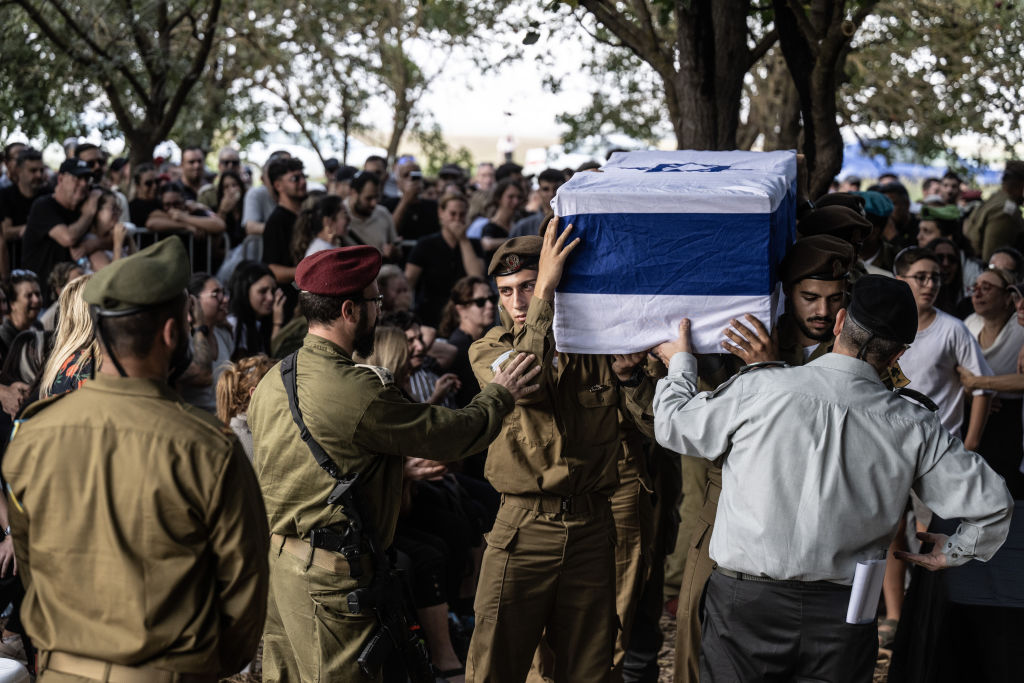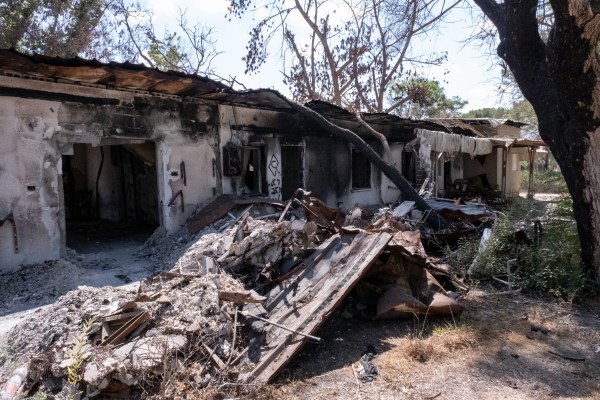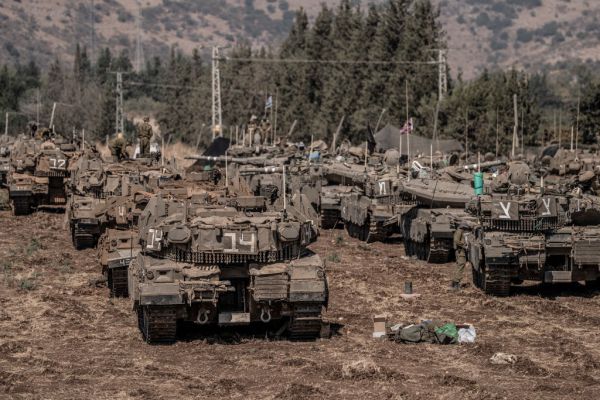Happy Tuesday! You know you’re really growing two-ton pumpkins for the love of the game when you’re spending thousands of dollars on gas to lug one from Minnesota to Northern California yourself.
Good thing Travis Gienger’s 2,471-pound pumpkin, Rudy, brought in $9 a pound for being the heaviest gourd at the Half Moon Bay World Championship Pumpkin Weigh-Off.
Quick Hits: Today’s Top Stories
- The man arrested on Saturday at a checkpoint outside former President Donald Trump’s rally in California’s Coachella Valley said Monday that he is “100 percent a Trump supporter,” and never intended to hurt the Republican nominee. The man, Vem Miller, was arrested for reportedly being “illegally in possession of a shotgun, a loaded handgun, and a high-capacity magazine,” according to the Riverside County Sheriff's Office. Miller—who said he works in the media—claims he started carrying the guns after receiving anonymous death threats. He was released on a $5,000 bail shortly after his arrest.
- China on Monday conducted a full-scale military drill simulating an assault on Taiwan that Chinese military spokesman Li Xi said was a “stern warning to the separatist acts” in Taiwan. The exercises seemed to be retaliation for Taiwanese President Lai Ching-te’s remarks last week, in which he promised to “resist annexation or encroachment upon our sovereignty.” U.S. State Department spokesman Matthew Miller condemned the drill, and said China’s behavior was “unwarranted and risks escalation.”
- Ukrainian President Volodymyr Zelensky claimed on Monday that North Korea is sending troops to Russia to assist in its invasion of Ukraine, though independent authorities have been unable to verify his assertion. Unnamed Ukrainian and South Korean officials told several outlets late last week that North Korean soldiers had already been deployed in the Russian-Ukraine war, including military engineers. North Korea has been providing Russia with ammunition, and in June, Moscow and Pyongyang agreed to a defense pact that Russian President Vladimir Putin said assured “mutual assistance in the event of aggression against” either country, though specific terms of the deal were not publicly disclosed.
- Ukrainian authorities on Monday said that a Russian missile strike on the southern Ukrainian port city of Odesa killed one person and injured eight others after the missile hit a grain storage facility and two foreign-flagged civilian cargo ships from Belize and Palau. The same Palau-flagged ship, Optima, was hit with Russian missile fire just last week, killing one Ukrainian and injuring four foreigners. The attacks add to the growing list of foreign-flagged commercial ships from small countries Russia has attacked in recent weeks, threatening a valuable maritime corridor for exports from Ukraine.
- The Canadian government on Monday expelled six Indian diplomats—including Indian High Commissioner to Canada Sanjay Kumar Verma, equivalent to ambassador—who allegedly targeted Indian dissidents and Sikh separatists living in Canada. The move comes one year after Canadian Prime Minister Justin Trudeau accused the Indian government of complicity in the June 2023 killing of Hardeep Singh Nijjar, a Canadian Sikh separatist. Canadian police said the six officials were directly implicated in intelligence-gathering against Sikh separatists who were subsequently targeted by India’s proxies. The Indian government claimed it had actually recalled the expelled diplomats due to an “atmosphere of extremism and violence” and later also expelled six of Canada’s diplomats from India.
- Lebanon’s health ministry said on Monday that an Israeli airstrike on the northern Lebanese village of Aitou struck an apartment building, killing 21 people. Israel has not confirmed the alleged attack, though Hezbollah-affiliated media reported the attack resulted in 18 “martyrs.” The Israel Defense Forces (IDF) did confirm on Monday morning that an IDF airstrike in the southern Lebanese city of Nabatieh killed Muhammad Kamal Naim, a Hezbollah anti-tank missile commander. Later on Monday, the IDF and Israeli intelligence agency Shin Bet jointly announced that last month Israel killed Hamas’ air formation commander in Gaza, Samer Abu-Daqa, who had helped plot the October 7, 2023, attacks on Israel.
- The IDF and Shin Bet also announced on Monday that an Israeli citizen, 30-year-old Vladislav Victorson, was arrested and indicted for allegedly plotting to assassinate an unspecified, high-profile Israeli public figure at the direction of an Iran. Israeli authorities said Victorson received orders—including acts of arson—via social media from an Iranian agent with the online name “Mari Hossi,” which Victorson carried out with his 18-year-old Israeli girlfriend, Anna Bernstein. She was also indicted Monday on vandalism and security charges. The agent, who later told Victorson he was Iranian, had asked him to assassinate the prominent Israeli by throwing a grenade into his house.
- The Rutherford County, North Carolina, Sheriff’s Office said on Monday that police officers arrested a 44-year-old man on Saturday suspected of threatening violence against Federal Emergency Management Agency (FEMA) disaster workers. The Washington Post reported over the weekend that FEMA ordered its employees to temporarily evacuate the county after National Guard service members reported seeing a truck of armed militants who were “out hunting FEMA,” though law enforcement said the suspect acted alone. The man—carrying a handgun and rifle at the time of his arrest—was charged with “going armed to the terror of the public” and released later that day on $10,000 bail.
- NASA on Monday launched a probe bound for one of Jupiter’s moons, Europa, in search of conditions necessary to sustain life in what scientists believe is an ocean beneath the moon’s icy exterior crust. The Europa Clipper probe will travel for five and a half years before it reaches Europa. The launch for the $5 billion project was delayed ahead of Hurricane Milton’s landfall last week but the probe took off without problem on Monday.
- The Royal Swedish Academy of Sciences on Monday awarded the 2024 Nobel Prize in Economic Sciences to Daron Acemoglu, Simon Johnson, and James A. Robinson “for studies of how institutions are formed and affect prosperity.” The trio’s research focused on how differing societal institutions impact a country’s wealth over time, comparing inclusive institutions, which are associated with long-term benefits, and extractive institutions, which enable short-term gains for a powerful and select few.
Israel’s Divided Attentions

On Sunday night, Hezbollah launched a pair of drones targeting an Israel Defense Forces (IDF) base near Binyamina, a town south of Haifa. Israeli air defenses successfully intercepted one of the drones off the coast, but the second dropped from Israeli radar before striking a dining hall as troops were eating. Four soldiers were killed and nearly 60 were wounded in the deadliest attack since Israel ramped up its strikes against the terrorist paramilitary group last month.
Even as the IDF has in recent weeks trained most of its fire on the enemy to the north, airstrikes and ground operations in Gaza continue to prevent Hamas from regrouping. Meanwhile, the Biden administration has relaxed its calls for an immediate ceasefire in Lebanon, backing Israel’s current efforts against Hezbollah. The new tack is likely a reflection of the hope that degrading the group militarily will push it toward a diplomatic solution and possibly shrink its hold over the government of Lebanon.
It’s been nearly a month since the IDF announced it was shifting its focus to Hezbollah in the north. Beginning in mid-September, the Israeli military executed a series of extraordinarily successful operations, including the pager and walkie-talkie attacks; a massive air operation, “Northern Arrows,” that destroyed possibly as much as half of Hezbollah’s significant rocket and missile launching capabilities; and a rolling campaign against the group’s leadership, which included the killing of Hezbollah leader Hassan Nasrallah. The IDF also announced Monday that it had killed the commander of Hezbollah’s Radwan Force anti-tank missile unit, which had been launching projectiles at northern Israel.
IDF troops have also continued to carry out ground operations in Lebanon in recent weeks—destroying Hezbollah infrastructure and tunnels, and capturing weapons and munitions caches—after disclosing earlier this month that the IDF had carried out cross-border raids throughout the current conflict with Hezbollah. The operations revealed that Hezbollah had been using the border area as a staging ground for an October 7-style attack.
Despite Israel’s military success, Hezbollah remains a threat, as evidenced by Sunday’s drone strike. “Hezbollah has not unleashed the full onslaught of its remaining capabilities,” Jonathan Ruhe, the director of foreign policy at the Jewish Institute for National Security of America, told TMD. “But that being said, they’re still launching more projectiles into Israel in the past two or three weeks than they have in the previous year.” Most of central Israel was under rocket alerts yesterday as ballistic missiles fired from Lebanon were intercepted.
The Pentagon greenlit the deployment of a U.S. air defense battery to Israel on Sunday, along with approximately 100 U.S. personnel to operate the system. The Defense Department said the Terminal High-Altitude Area Defense (THAAD) battery would “bolster Israel’s air defenses” and defend the country “from any further ballistic missile attacks by Iran.” The presence of U.S. troops on the ground recalls the U.S. sending Patriot missile batteries and troops to operate them to Israel in 1991 during the First Gulf War. Raphael Cohen—the director of the RAND Corporation’s strategy and doctrine program and a colonel in the U.S. Army Reserves—told TMD the battery will be a welcome supplement to the defenses but that “the symbolism here is important.”
The additional material support from the U.S. comes as the Biden administration has backed away from its initial calls for a ceasefire in the north. When the conflict escalated last month, President Joe Biden and French President Emmanuel Macron released a joint statement calling for a temporary ceasefire and a long-term diplomatic resolution along the lines of the U.N. Security Council Resolution 1701. The measure—included in the 2006 ceasefire that ended the Second Lebanon War—established a demilitarized buffer zone south of the Litani River, which Hezbollah has never respected.
Israeli Prime Minister Benjamin Netanyahu quickly rejected the American-French ceasefire plan. Israel has agreed with the resolution and the buffer zone, but only if its status is enforced. “We have no desire to stay in Lebanon,” Danny Danon, Israel’s ambassador to the U.N., said last week when discussing enforcement. “I think the only troops that can do that will be the Lebanese military and UNIFIL, but they need to have the strength, the power, and the ability to ensure that Hezbollah is not coming back to the same places.”
For now, the IDF seems focused on pursuing its own enforcement measures. “We will not allow Hezbollah to position itself in these places in the future,” Lt. Gen. Herzi Halevi, the IDF chief of staff, said earlier this month.
Israeli operations have caused friction with the U.N. observers—the U.N. Interim Force in Lebanon (UNIFIL)—posted throughout the buffer zone. Five peacekeepers have been injured by Israeli fire, according to the international body. “We regret any harm done to UNIFIL personnel, and the IDF is doing its utmost to prevent such incidents,” Netanyahu said yesterday, but he faulted the U.N. for not responding to Israel’s earlier requests that the U.N. observers temporarily withdraw from combat areas. The IDF has said they’ve discovered Hezbollah weapons and tunnels within a few hundred feet of some UNIFIL outposts.
This month, the Biden administration backed Israel’s operation against Hezbollah. “The situation on the ground has changed from where we were two weeks ago,” Matthew Miller, State Department spokesman, said at a briefing on Wednesday. “We hope that this change in situation on the ground will change Hezbollah’s calculation, ultimately. ”
Some analysts see Israel’s “on the ground” success as the driving factor in the administration’s public shift. “I think the U.S., increasingly, just saw, ‘Okay the fastest way to get to a deescalation—which the U.S. have been pursuing for more than a year—is Israel’s current escalation,’” Ruhe argued. “I think they implicitly admitted that.”
Others see the developments as more reflective of the push-and-pull dynamic between the Netanyahu government and the Biden administration over how Israel conducts both wars against Hezbollah and Hamas in Gaza. “There’s a little bit of Biden picking and choosing his battles,” Cohen told TMD. Biden reportedly asked Netanyahu on a call Wednesday to stop striking Hezbollah targets in Beirut because of the dense civilian population. Israeli media reported Friday that Netanyahu ordered the IDF to avoid Beirut strikes, though the prime minister’s office denied the reports.
Both Ruhe and Cohen see part of Israel’s current military strategy as designed to push Hezbollah toward a diplomatic off-ramp that would ensure the safety of northern Israel and decouple the conflict from the situation in Gaza. Hezbollah began launching its near-constant cross-border barrages on October 8, 2023, in solidarity with Hamas and has repeatedly said any ceasefire it agrees to would be contingent on a ceasefire in Gaza. Israel’s strategy could eventually bear some fruit. Naim Qassem, the deputy leader of Hezbollah, said last Tuesday he supported ceasefire talks and omitted for the first time any mention of Gaza.
Israel’s primary goal in the conflict in the north is for its tens of thousands of displaced citizens to return to their homes. But both Israeli and American officials have made some broader statements about ending or at least weakening Hezbollah’s hold on Lebanon. Netanyahu released a video message to “the people of Lebanon” last week, calling on them to take back their country now while Hezbollah is in a weakened position, and U.S. Secretary of State Antony Blinken said Friday that the future of the country is up to the Lebanese people. “The people of Lebanon have an interest, a strong interest, in the state asserting itself and taking responsibility for the country and its future,” he said.
Miller, the State Department spokesman, was even more explicit: “It is our goal to ultimately see the Lebanese people elect their own political representatives.”
It’s unclear whether there’s any realistic path to that end. Hezbollah’s supporters in the Lebanese parliament have prevented the body from electing a president since President Michel Aoun’s term ended in October 2022. “We lack any leadership to at least initiate a course where we can see a light at the end of the tunnel,” Ibrahim Mneimneh, a member of the Lebanese Parliament, told the Wall Street Journal last week. Cohen described the U.S. rhetoric as “more aspirational than concrete.”
Even with the focus on the north, Israeli forces have ramped up their operations in northern and central Gaza over the past few days to prevent a resurgent Hamas presence, including a strike early Monday morning at the al-Aqsa Martyrs Hospital compound. The IDF said it targeted a Hamas command center, but tent camps in a courtyard of the compound ignited in flames after the strikes. Four people were killed, with some apparently burning alive, and dozens of others were injured. An IDF spokesman said the fire was “likely due to secondary explosions”—potentially caused by munitions or fuel tanks—and that Israel was conducting a review of the incident.
The Biden administration has also pressured Israel on the humanitarian situation in northern Gaza following reports from the U.N. and relief groups that aid access has been restricted and food levels have dropped to the lowest levels in months. The World Food Programme said over the weekend that the main crossings in northern Gaza have been closed, and no food aid has entered since October 1. The Israeli agency coordinating aid deliveries denied the reports, sharing footage of aid trucks entering northern Gaza Monday. “Israel must urgently do more to facilitate the flow of aid to those in need,” Vice President Kamala Harris tweeted on Sunday evening.
And much will depend on the actions of Hezbollah’s top sponsor, the Islamic Republic of Iran. Israeli leadership has met repeatedly in recent days to plan its reprisal for Iran’s ballistic missile barrage against Israel earlier this month. Reporting from the Washington Post based on accounts from unnamed officials said that Netanyahu had informed Biden that the response wouldn’t target Iranian nuclear facilities or oil fields.
“We listen to the opinions of the United States,” Netanyahu’s office told the Post, “but we will make our final decisions based on our national interest.”
Worth Your Time
- Can either major U.S. political party build a majority coalition again? “What the Republican and Democratic coalitions have in common is enough strength to stalemate the other party but not enough to dominate,” Ruy Teixeira and Yuval Levin wrote in their latest report for the American Enterprise Institute. “As a result, a noxious back-and-forth has defined American politics for a generation. … In this era, both parties play the minority party’s traditional role. Each party runs campaigns focused almost entirely on the faults of the other, with no serious strategy for significantly broadening its electoral reach. Each offers itself fundamentally as an alternative to the other, even if it has the incumbent majority in Congress or holds the White House. And neither offers a clear or broadly compelling vision of the country’s future,” the pair observed. “Can this stalemate be broken? It can, but that would require one party to go outside the comfort zone of appealing to its base supporters and aim directly at the broad center of American politics.”
- The results of the 2020 election were contested with a galling vigor, but as the 2024 election nears, it’s worth remembering that 2020 was not the only U.S. presidential race in history to be disputed. Joined by our friend Megan McArdle, Andy Mills and Matthew Boll took a look back at contested elections throughout the years in the podcast episode, “No, You Stole The Election!” “There are a number of Republicans who still feel like the election in 1960 was stolen by the Kennedy team,” and perhaps not without some merit. Nixon nevertheless conceded the 1960 election to Kennedy. “He does so graciously and here is an interesting twist,” McArdle said, “he becomes only the second person in American history who has to certify his own election loss.”
Presented Without Comment
Philadelphia Inquirer: Trump’s Montco Town Hall Turns Into Playlist Party After Medical Emergencies: ‘Let’s Just Listen to Music’
Also Presented Without Comment
Axios: Tensions Rise Between Harris and Biden Teams as Election Nears
Biden’s team wants Harris to win the election, but many senior Biden aides remain wounded by the president being pushed out of his re-election bid and are still adjusting to being in a supporting role on the campaign trail.
Also Also Presented Without Comment
Washington Post: Michigan GOP Candidate’s Ad Aimed At Black Voters Has Wrong Election Date
In the Zeitgeist
Rebecca Ferguson seems to have found her groove in futuristic, apocalyptic landscapes, considering the last time we saw her on screen it was as Paul Atreides’ jihad-encouraging mother in Dune 2. Now—in season 2 of Apple TV+’s Silo—she’s trying to understand the secrets of an underground grain silo that contains the last 10,000 people on Earth.
Toeing the Company Line
- It’s Tuesday, which means Dispatch Live (🔒) returns tonight at 8 p.m. ET/5 p.m. PT! And it will be an extra special edition, as Steve and Jonah go live to discuss the state of The Dispatch after we marked our fifth anniversary last week. Keep an eye out for an email later today with information on how to tune in.
- In the newsletters: Kevin reminded readers (🔒) that bad elected officials are a product of American voters and the Dispatch Politics crew reported on the race to win over Pennsylvania suburbanites in their last dispatch from the Keystone State.
- On the podcasts: In a live recording of Advisory Opinions from Columbia Law School, Sarah and David break down two cases from the Supreme Court’s recent oral arguments.
- On the site: In the latest installment of our Dispatch symposia, our contributors weigh in on what a Trump and Harris domestic policy agenda would look like, Stirewalt looks back at the 1840 election and how it compares to 2024, and John Gustavsson explains why the U.K.’s release of the Chagos Islands is a bad idea.
Let Us Know
What Dispatch-related questions would you like to hear Steve and Jonah discuss on tonight’s Dispatch Live?








Please note that we at The Dispatch hold ourselves, our work, and our commenters to a higher standard than other places on the internet. We welcome comments that foster genuine debate or discussion—including comments critical of us or our work—but responses that include ad hominem attacks on fellow Dispatch members or are intended to stoke fear and anger may be moderated.
With your membership, you only have the ability to comment on The Morning Dispatch articles. Consider upgrading to join the conversation everywhere.